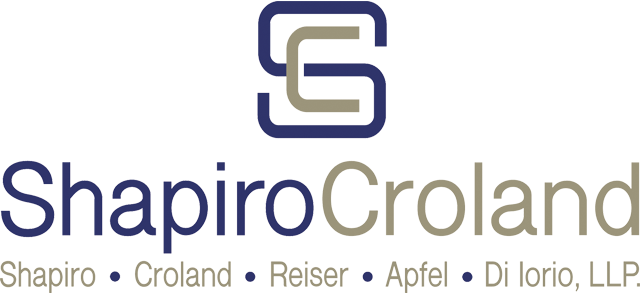What is a contingency fee arrangement? A contingency fee is based on a percentage of the amount collected or recovered.The fee is "contingent" on prevailing in the case and collecting from the judgment debtor.
Does your firm offer contingency fee arrangements? Yes. Shapiro Croland offers contingency fee arrangements depending upon a number of different factors, such as the type of case, the nature of the claims, the amount in dispute, where the defendant(s) is/are located, and which court has jurisdiction. Typically, contingency fee arrangements are limited to commercial accounts receivable involving the sale of goods which remains unpaid and breach of contract involving a promissory note.
What is a flat fee arrangement? A flat fee is a fixed price quote to handle either portions of the case or the entire case regardless of the amount of time spent or the outcome of the case.
Does your firm offer flat fee arrangements? Yes. Shapiro Croland offers flat fee arrangements for certain project-based matters that are limited in scope, such as motions to void judgments, motions to vacate a sheriff's sale, and applications to docket a judgment from another state in New Jersey.
What is an hourly fee arrangement? An hourly fee is an arrangement where the law firm charges a client based on the amount of time spent on the case, which is billed at agreed upon hourly rates.
Does your firm offer hourly fee arrangements? Yes. Shapiro Croland offers hourly fee arrangements. Typically, contested litigation disputes are handled on an hourly fee basis.
Does your firm represent lenders in mortgage foreclosure actions? Yes. Shapiro Croland represents financial lending institutions and private mortgage lenders in actions to foreclose residential and commercial mortgage loans that are in default.
Which New Jersey Court should I file my claim with? The Superior Court of New Jersey is divided into three different levels for civil disputes: Small Claims, Special Civil Part, and Law Division. The Small Claims section has jurisdiction for claims up to $5,000. The Special Civil Part section has jurisdiction for claims up to $15,000. The Law Division has jurisdiction for civil claims exceeding $15,000.
What is the Chancery Division? The Superior Court of New Jersey has a separate division that has jurisdiction over foreclosure matters and other cases where the primarily relief sought is equitable in nature. Examples of cases typically decided by the Chancery Division include business and partnership disputes, minority shareholder oppression claims, actions to partition real estate, actions to compel specific performance, and actions where a party seeks injunctive relief.
Do I have a right to a jury trial? Cases heard by the Small Claims section are typically decided by judges. If a jury demand is filed in a Small Claims case then the Court will transfer the case to the Special Civil Part. Although the Special Civil Part affords litigants the right to a jury trial, see New Jersey Court Rule 6:5-3, those cases are usually decided by judges because of the delays and extra costs associated with a jury trial. Litigants in Law Division cases are entitled to demand a jury trial.
Can I recover my attorney's fees if I win the case? New Jersey follows the American Rule of jurisprudence which requires each side to bear the costs of its own counsel fees. However, there are exceptions. Courts are vested wth the discretion to award attorney's fees to the prevailing party if authorized by: (i) court rule; (ii) statute; or (iii) contractual provision. Even if one of these exceptions applies, the Court has the discretion to disallow attorney's fees or award a reduced amount of attorney's fees based on certain factors, including the amount of time spent by the lawyer, the lawyer's reputation, complexity of the case, and conduct of the adverse party.
How long will my case take? Small Claims cases are usually resolved in less than 3 months. Special Civil Part cases are usually resolved between 3 to 6 months. Law Division cases typically take a year or more to get resolved. Obvously, there are intervening causes that may alter these timelines such as a party switching attorneys, availability of judges, availability of expert witnesses, vacation schedules, health or personal obligations, backlog of cases, or a bankruptcy filing by one of the parties.
